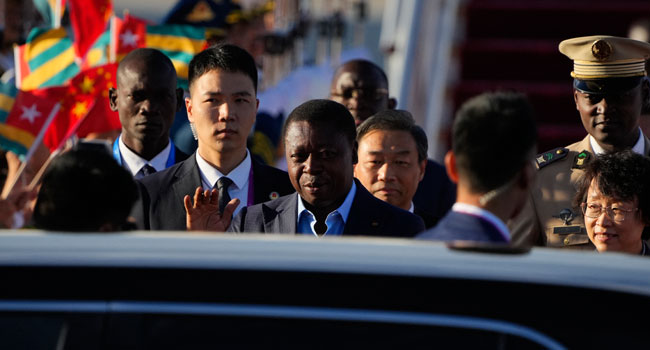Africa
African Leaders Seek Major Loans and Investments in Beijing

African leaders gather in Beijing to explore significant loan agreements and investment opportunities, aiming to enhance economic growth and development.
This week, African leaders are arriving in China’s capital to source funding for significant infrastructure projects. They are doing so with the aim of preparing themselves for increasing pressure from major powers vying for control over resources and influence on the continent.
In the previous ten years, China has bolstered relationships with African countries by providing them billions of dollars in loans that have assisted in developing infrastructure. However, this move has also occasionally caused controversy as it resulted in bringing enormous debts to these nations.
China has dispatched an abundance of laborers to Africa for the construction and completion of its immense projects, as well as making use of the continent’s abundant natural resources including copper, gold, lithium and rare earth minerals.
Beijing has announced that the upcoming China-Africa forum will be their biggest diplomatic gathering since Covid-19 hit. The event is set to attract top officials from South Africa, Nigeria and Kenya among other nations with an expectation of numerous delegations attending as well.
According to Ovigwe Eguegu, a policy analyst at consultancy Development Reimagined, African countries were seeking ways to utilize the potential for growth in China.
According to Chinese state media, Africa’s biggest trading partner is China – the second largest economy in the world. In just six months of this year, bilateral trade between them reached a staggering $167.8 billion.
According to the Chinese Loans to Africa Database, Beijing provided its largest loans in five years to African countries last year. The foremost recipients were Angola, Ethiopia, Egypt, Nigeria and Kenya.
According to analysts, as China’s economy continues to slow down, Beijing is becoming more hesitant in spending large amounts of money.
Despite the difficulties faced by several African countries in repaying their loans, China has refused to provide any debt relief, leading to a reduction of expenditure on essential public services.
According to Tang Xiaoyang from Tsinghua University in Beijing, “There have been numerous changes that occurred around the world such as Covid-19, geopolitical tension and economic challenges” since the previous China-Africa forum six years ago.
He said that the previous approach of providing loans for extensive infrastructure and rapid industrialization is no longer tenable.
The massive infrastructure project known as Beijing’s Belt and Road Initiative is a central pillar of Xi Jinping’s efforts to expand China’s influence overseas, with the continent playing a vital role in this strategic plan.
African countries have received essential investments for ventures such as railways, ports and hydroelectric plants through the BRI.
Beijing is accused by critics of burdening countries with debt and providing financial assistance for infrastructure projects that have a harmful impact on the environment.
A $5 billion railway project connecting the Kenyan capital Nairobi to Mombasa, funded by Exim Bank of China, has sparked controversy.
However, the planned second phase to extend the line into Uganda was never realized due to both nations facing difficulties in repaying debts incurred from BRI.
Last year, President William Ruto of Kenya requested a $1 billion loan from China and asked for the revamping of current debts to accomplish other inactive BRI ventures.
China is currently owed over $8 billion by the country.
According to Alex Vines, who is the head of London’s Chatham House Africa Program, Kenya’s recent fatal protests were incited by the government’s obligation “to repay its debts to global lenders such as China”.
Vines and other analysts anticipate that African leaders will prioritize not just increased Chinese investment, but also more favorable loan terms at the upcoming forum in response to recent events.
READ ALSO: Beijing Urges Washington to Halt ‘Military Collusion’ with Taiwan
In central Africa, companies from the West and China are competing to gain control over uncommon minerals.
Rich deposits of manganese, cobalt, nickel and lithium can be found on the continent which are vital for renewable energy technology.
As much as one-fourth of the world’s known manganese reserves can be found in Gabon’s Moanda region, while 37 percent of global production of this metal is attributed to South Africa.
The Democratic Republic of Congo holds the majority share, about 70 percent, in cobalt mining worldwide. However, China takes the lead with a processing percentage of 50 percent.
Africa is also affected by the escalating geopolitical tensions between China and the United States, who are in conflict over issues ranging from trade to recognizing Taiwan’s sovereignty.
Beijing’s negative impact has raised concerns for Washington.
The White House stated that China aimed to promote its own commercial and geopolitical objectives while impeding transparency and openness in 2022.
Although Beijing does not desire a new cold war with Washington, it aims for mutually beneficial collaboration through “win-win” cooperation by stimulating trade and advancing development.
According to Tang from Tsinghua University, our assistance goes beyond simply providing aid; we also provide them with help.
“We are your partners during the development process and we also gain benefits from it.”
However, analysts are concerned that African nations may have to choose between sides.
According to Eguegu from Development Reimagined, African nations have insufficient bargaining power when it comes to dealings with China.
“It is believed by some individuals that the US can be utilized to counterbalance China,” he stated. “This, however, is not feasible.”
